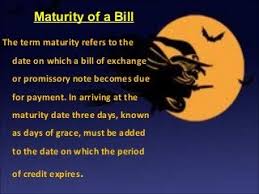- Books Name
- Vision classes Accountancy Book
- Publication
- Vision classes
- Course
- CBSE Class 11
- Subject
- Accountancy
Maturity, endorsement, discounting
Maturity of Bill
The date on which a bill of exchange or a promissory note becomes due for payment is known as maturity of bill. If a bill dated March 05 is payable 30 days after date it, falls due on April 07, i.e., 33 days after March 05 If it were payable one month after date, the due date would be April 08, i.e., one month and 3 days after March 05.

However, where the date of maturity is a public holiday, the instrument will become due on the preceding business day. In this case if April 08, falls on a public holiday then the April 07 will be the maturity date. But when an emergent holiday is declared under the Negotiable Instruments Act 1881, by the Government of India which may happen to be the date of maturity of a bill of exchange, then the date of maturity will be the next working day immediately after the holiday.
Discounting of Bill
If the holder of the bill needs funds, he can approach the bank for encasement of the bill before the due date. The bank shall make the payment of the bill after deducting some interest (called discount in this case). This process of encashing the bill with the bank is called discounting the bill. The bank gets the amount from the drawee on the due date.
Endorsement of Bill
Any holder may transfer a bill unless its transfer is restricted, i.e., the bill has been negotiated containing words prohibiting its transfer. The bill can be initially endorsed by the drawer by putting his signatures at the back of the bill along with the name of the party to whom it is being transferred. The act of signing and transferring the bill is called endorsement.

 Vision classes
Vision classes
